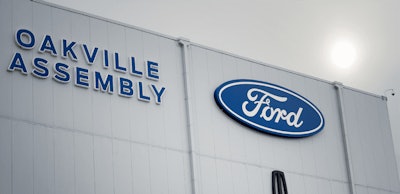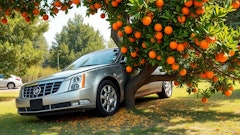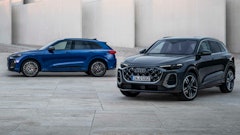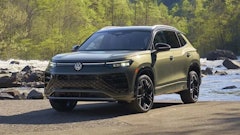
Oakville, Ontario — Ford and Unifor have confirmed the two groups have reached a new national labour agreement establishing Ford as the first automotive manufacturer in Canada to build fully battery electric vehicles as part of a $1.8-billion investment, the automaker announced Monday.
Unifor said the contract includes a 1.95 billion investment in the company’s Canadian facilities. Roughly 1.8 billion of that will go towards the Oakville assembly plant, where five new electric models will roll off the lines between 2025 and 2028.
The tentative agreement was praised by Flavio Volpe, president of the Automotive Parts Manufacturers’ Association, for providing long-term stability in the auto industry for Ford. The investment shows Canada can position itself to produce EVs as more of them come to market, said Volpe, who also believes the USMCA agreements regional content requirements work when it comes to spurring domestic investment.
“It says that the new rules in the USMCA do, in fact, make Canada a more attractive place to make the kinds of cars that companies bank on,” he continued.
Under the USMCA agreement, 75 percent of a vehicle’s content must be sourced from within the member countries for it to cross the border as tariff-free. But, according to Ford, they see an opportunity with the Oakville plant and with regional suppliers. Volpe said that Canada’s suppliers would be ready to support EV production in Oakville, adding that parts-makers currently supplying the Oakville plant would have the “first shot” at new volume.
Having more Canadian suppliers and suppliers in the Midwest U.S, could have a ripple effect and cause other automakers to begin building their own electric vehicles in Canada.
“If some of this is being produced domestically, that could lead to other companies saying it would be easier to put product X — where X equals an electrified product — here because we can more easily source [parts] from these suppliers locally,” said Sweeney.
Unifor President Jerry Dias has said he expects the plant to build about 200,000 EVs by 2028, and the first model will begin production in 2025 after a plant retooling in 2024.
According to Dias, Ford Motor will assemble batteries for the EVs in Oakville, though components will be sourced from elsewhere.
“We have the lithium. We have the nickel. We need to manufacture here,” said Ontario Premier Doug Ford last week. “Do you want to be hauling these batteries from a southern U.S. state up to Canada? Or do you want the batteries manufactured down the street that we can ship in hours, saving millions? I want the battery manufacturing done here.”






















